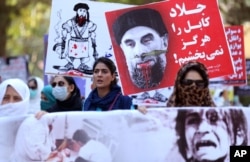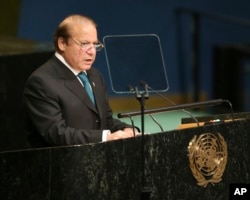Afghanistan’s unity government, after months of troublesome negotiations, has signed a long-delayed draft peace agreement with the country’s second largest insurgent group, led by a fugitive warlord with a history of war crimes and rights abuses.
The groundbreaking truce signed Thursday with the Hizb-Islami (HIG) faction comes amid hopes it might ease security challenges facing the war-torn nation and encourage other insurgent groups fighting alongside the Taliban to join the peace process.
This is the first peace agreement in the 15-year Afghan war the Taliban launched after it was ousted by a United States-led military coalition in 2001.
Hizb-Islami is led by Gulbuddin Hekmatyar, a longtime guerilla commander whose forces fought against the Soviet Union in the 1980s. Later, his militias battled the Taliban for control of Afghanistan during the brutal civil war of the 1990s.
Afghan National Security Advisor Hanif Atmar singed the accord with Hekmatyar’s chief negotiator, Karim Amin in a nationally broadcast ceremony.
Atmarr said the peace deal with Hekmatyar demonstrates the government's sincere resolve to seek a peaceful negotiated settlement to the Afghan conflict.
"We have demonstrated our resolve and I call on the Taliban it is time for you to come to the table for peace talks if you sincerely desire it... End fighting and violence, free yourself from the influence of Pakistan, foreigners and terrorist groups, and accept the Afghan constitution," he said. "We are ready to offer you the same concessions that we have granted to the Hizeb-Islami."
Qareeburahman Saeed, a member of Hezb-i-Islami's leadership council and a former spokesman for the group, offered his apologies to those Afghan families who lost loved ones during the Afghan civil war. In an VOA interview broadcast Thursday, the spokesman formally apologized for those hurt in the fighting.
"Naturally, we apologize for those who might have been martyred, injured or financially affected," he said.
Thursday's agreement will enable the fugitive warlord, a designated “global terrorist,” to return to the national politics after years in hiding, allegedly in neighboring Pakistan.
That has led to objections from human rights activists, a group of whom marched in the capital city while the ceremony was underway, carrying posters denouncing Hekmatyar as a "Butcher of Kabul."
“His return will compound the culture of impunity that the Afghan government and its foreign donors have fostered by not pursuing accountability for the many victims of forces commanded by Hekmatyar and other warlords that laid waste to much of the country in the 1990s,” said Patricia Gossman, senior Afghanistan researcher at the Human Rights Watch.
She noted that Hekmatyar is one of the country's most notorious war crimes suspect and he is not alone in enjoying impunity.
“None of the Afghan warlords from the 1990s has been held accountable. That, and the failed disarmament of abusive militias, have crippled reforms needed to build effective government institutions crucial for a lasting peace.”
During Thursday's ceremony, Atmar tried to allay such fears, assuring critics the agreement does not contain any provision that would undermine progress Afghanistan has made to promote human rights, particularly women’s rights. He said that the insurgent group will announce a permanent cease-fire, cut ties to any terrorist group and halt its military activities.
In turn, the Afghan government, Atmar added, will be obliged to grant the group full political rights and will work for the removal of Hekmatyar’s name from the U.S. and the United Nations lists of designated foreign terrorists. The national security advisor also called on the Taliban to cease hostilities and join the peace process.
“We welcome today’s accord negotiated and concluded by the Government of Afghanistan and Hizb-e Islami Gulbuddin (HIG) as a step in bringing the conflict in Afghanistan to a peaceful end,” the U.S. embassy in Kabul said.
It added the United States continues to support an Afghan peace process that results in armed groups ceasing violence, breaking ties with international terrorist groups, and accepting the country’s constitution, including protections for women and minorities.
The peace agreement will formally come into effect after both President Ashraf Ghani and Hekmatyar sign it, but officials would not announce a timetable.
Though largely symbolic in nature, the deal with Hekmatyar is being seen a significant political boost for President Ghani whose reconciliation and peace attempts with the Taliban have failed to achieve results.
The Afghan leadership blames neighboring Pakistan where it says the Taliban and its ally the Haqqani Network continue to enjoy sanctuaries to plot attacks inside Afghanistan.
Pakistani officials last year arranged and hosted a direct meeting between Taliban and Ghani’s negotiators but since then the Islamist insurgency has intensified the war and has made significant territorial gains in Afghanistan.
The spike in violence has also fueled tensions with Pakistan and both the countries are currently locked in a daily war of words over exchange of allegations and counter allegations.
The U.N. Assistance Mission in Afghanistan (UNAMA) said it is encouraged by the initialing in Kabul of the draft peace agreement.
Addressing the annually U.N. General Assembly in New York Wednesday, Pakistani Prime Minister Nawaz Sharif reiterated that a peace dialogue between the Taliban and the Kabul government is the only way for establishing lasting peace in Afghanistan.
“Progress will be assured only when the Afghan parties themselves conclude that there is no military solution to the Afghan war, and work assiduously, through a meaningful dialogue process, for achieving reconciliation and peace at home,” Sharif noted.
The Afghan Taliban has lately not indicated whether it is willing to join peace talks with Kabul. Instead its officials cite battlefield advances and unity in Taliban ranks under its new leader Mullah Hibatullah as signs of gaining strength, contradicting Afghan and U.S. assertions the Islamist group has weakened.
(VOA's Mohammad Hashem Habibzada also contributed to this report.)






